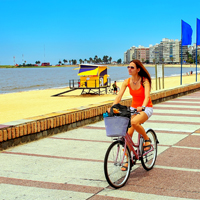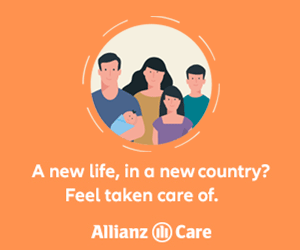Living in Uruguay
Last updated on Feb 05, 2024
Summary: People describe life in Uruguay as relaxed, laid-back, and peaceful. Expats love the low cost of living, the friendly people, the beautiful beaches, and the vibrant culture. The average cost of living for an expat is around $1,500 to $2,000 per month, depending on lifestyle. The population of Uruguay is approximately 3.5 million people, and the largest cities are Montevideo (the capital), Salto, Paysandú, Las Piedras, and Rivera. The cons of living in Uruguay include the high cost of imported goods, the lack of job opportunities, and the slow internet speeds. Additionally, the crime rate is higher than in some other countries in South America.
What do I need to know about living in Uruguay?
When we asked people what advice they would give someone preparing to move to Uruguay, they said:
"Learn Spanish before you come! Yes, they say everyone speaks English, but that's not true of the interior (or anyplace away from Montevideo). Learn Spanish! Learn to ride a small motor bike or 4-wheeler. You do not want to own a car here; the streets will eat it. Also, the salt air from the Atlantic. We use the bus to go out of town for major purchases, and use a small scooter & a 4-wheeler for getting around town. DRESS DOWN! Wearing your old sweats & flip-flops works to your advantage here. Especially if you're thinking of living here, you want to dress down. Flashy clothes gets you robbed. Dress down comfy - jeans, t-shirt, camos, work clothes.... Leave the suit in the suitcase. Learn to use a fireplace and/or wood stove competently without smoking up the house. Learn what to look for before you rent a house with a fireplace or wood stove. I.e., don't rent a small house with a huge fireplace! The big fireplace will actually suck more heat out of the house than it leaves in it - where YOU are! Find a house with a fireplace sized appropriately. It will make the difference between an economical, comfy winter and a chilly, expensive one. If renting, you will never find a Uruguayo house that has hot water in the kitchen, so just get over it. They have a tap in the shower and a bucket. Fill bucket with hot from the shower & tote it to the kitchen. Ta. Learn small motor repair - esp. chainsaws, motorbikes, and 4-wheelers. We have 2 mechanics in town and they will both skin you alive. One will fix the vehicle just enough to keep it running a week, then you'll be back for more repairs. The other will siphon the gas from your tank & tell you it was empty when you brought it to him. GAS is expensive. At present, we pay 70 pesos per liter here in Diablo for gas brought in from Brazil. If you buy from the gas station in Coronilla, it sells for 42 pesos/liter and Uruguayo gas, better quality. Learn to work with propane. Cooking revolves around the 13kg propane cylinder here. BUY MORE THAN ONE so you have time to wait for refills to be delivered. "Manana" (minus tilde) does not always mean "tomorrow" - it could be next week. Learn how to connect & disconnect your gas tanks yourself. Learn how to cook over wood on the grill. Charcoal in the bag exists here, but nothing like Kingsford. It's expensive when you can find it and it throws sparks. Learn to cook in the fireplace - you might enjoy it. Make yourself speak Spanish, even if you're shy or feel embarrassed. Check out DuoLingo.com. Even if you're tripping over your words, the people will appreciate you more for making the effort. Shop around for your internet. Antel (govt phone company) currently offers LTE superfast modem with 30GB downloads for 1,200 pesos (about $60USD) per month. BUT... when you get there to buy one, they're always out of them. We just got a new one after our old contract expired... We pay 750 pesos/mo for 12gb, about $25USD/month. DON'T be afraid to shop on the Brazil side of Chuy, the international free zone town. We bought our wood stove there at factory prices because Brazil's cast iron is better made than UY's. UY produces very little in the way of picante sauces, etc., so we get most of our groceries there as well. Clothes, groceries, shoes, tools, etc., we buy in Brazil for better selection, better prices, better quality," explained one expat living in Punta del Diablo, Uruguay.
"Bring flip-flops. Bring your favorite condiments, especially if you like spicy foods. Leave heavy coats behind, as winter only lasts about 3 months & spring is usually beautiful. That said, bone up on your fire-tending skills, as most home heating is by wood fire... If you split your own wood, you can buy it cheaper. Make friends with a good firewood vendor. Bring earmuffs for winter, as we do have a lot of wind (the Pamperos). Bring comfy pants with lots of pockets for shells, etc. when you hit the beach. ALWAYS save your empty beer bottles, as you get a 10- to 15-peso discount when you return the "dead soldiers" as you purchase more beer. Same with wine - returning the bottles (esp. the 5-liter bottles) saves you 165 pesos or so (about $8.50). Get the tri-fold maps from an Ancap station. Worth every penny of the $10, they have a map of UY, another of all the MercoSur countries, a map of Montevideo, and city street maps of all of the major cities... PDD is not listed, as we have only one main road through town... ;p Be prepared to be unprepared for the welcome you receive, the wonderful food & wine, the genuinely friendly people. We have found our new home, for sure. Lay out your trips in advance & plan to use the least fuel possible... Gas is about $8/gallon, so we use it well. We bought a 1968 VW Bug for $3500 USD. She's economical, reliable & parts are cheap as dirt. We bought an engine belt, new fuel lines, fuel filter, new seatbelts, and a new door knob for only $10. The fuel lines & filter were installed curbside at no additional cost. We had the resistor for the windshield wipers changed out curbside & were given a handful of extra fuses. The labor took 2 hours, but the total cost was $16. Learn to use propane. It's one of the things they do best here. Exchange of a 33-lb cylinder is only $16. The 2-lb cylinder for the gas stove in the kitchen costs $5. If you plan to immigrate, come down during the fall & stay thru the winter, so you know what you're getting into. You will probably be pleasantly surprised - we were. Now that we're hooked, we're buying property & starting building a home. Buy a cell phone from Antel, the govt phone company. A mid-range phone with camera & MP3 player, Bluetooth, and internet will set you back $26, with $5/month for service. :D Try the Uruguayo products. We have found many to be superior to brands we used in the US. If you have allergies, plan to obtain some antihistamines & decongestants from a farmacia here. You can get Loratadine cheaply for the first; you can still get pseudoephedrine down here without being spread-eagled outside the pharmacy. If you have health issues & are on regular medications, most are available over the counter without prescription here. Put off any dental work until you get here - it's incredibly high quality, latest technology, and incredibly cheap... I had a cracked molar that eventually broke, losing 25% of the back corner. Mario, my fabulous dentist, my hero - fixed it for $40 USD. Be prepared to be amazed at how little govt interference these people have in their lives. Be prepared to make friends with the police. They are not at all the threatening thugs one fears in the US," said one expat in Punta del Diablo.
Answer Question & View More Answers
 Mobility LC
Mobility LCConnect
Mobility LC is committed to work hard to make your Uruguayan immigration and relocation process a reality. We can provide you with the best local contacts and will guide you all the way through the process offering support in 5 different languages. Your success is our personal goal.
Click connect to have our partner contact you via e-mail and/or phone.
 Mobility LC
Mobility LCMobility LC is committed to work hard to make your Uruguayan immigration and relocation process a reality. We can provide you with the best local contacts and will guide you all the way through the process offering support in 5 different languages. Your success is our personal goal.
Connect
Click connect to have our partner contact you via e-mail and/or phone.
How do I meet people in Uruguay?
Please login to continue reading this article.
Not a member? Join Today (it's free).
About the Author
 Joshua Wood, LPC joined Expat Exchange in 2000 and serves as one of its Co-Presidents. He is also one of the Founders of Digital Nomad Exchange. Prior to Expat Exchange, Joshua worked for NBC Cable (MSNBC and CNBC
Primetime). Joshua has a BA from Syracuse and a Master's in Clinical and Counseling Psychology from Fairleigh Dickinson University. Mr. Wood is also a licensed counselor and psychotherapist.
Joshua Wood, LPC joined Expat Exchange in 2000 and serves as one of its Co-Presidents. He is also one of the Founders of Digital Nomad Exchange. Prior to Expat Exchange, Joshua worked for NBC Cable (MSNBC and CNBC
Primetime). Joshua has a BA from Syracuse and a Master's in Clinical and Counseling Psychology from Fairleigh Dickinson University. Mr. Wood is also a licensed counselor and psychotherapist.
Some of Joshua's articles include Pros and Cons of Living in Portugal, 10 Best Places to Live in Ireland and Pros and Cons of Living in Uruguay. Connect with Joshua on LinkedIn.
Additional Information:
- Uruguay Guide
- Healthcare & Health Insurance in Uruguay
- Members Talk about Healthcare & Health Insurance in Uruguay
- Best Places to Live in Uruguay
- Guide to Real Estate in Uruguay
- Pros & Cons of Living in Uruguay
- Cost of Living in Uruguay
- 7 Things to Know Before Moving to Uruguay
- 8 Best Places to Live in Uruguay
- 5 Great Places to Retire in South America
- 10 Tips for Living in Uruguay
- 2024 Guide to Living in Uruguay
- Pros and Cons of Living in Uruguay 2024
- 2024 Guide to Moving to Uruguay

 Uruguay
Uruguay

